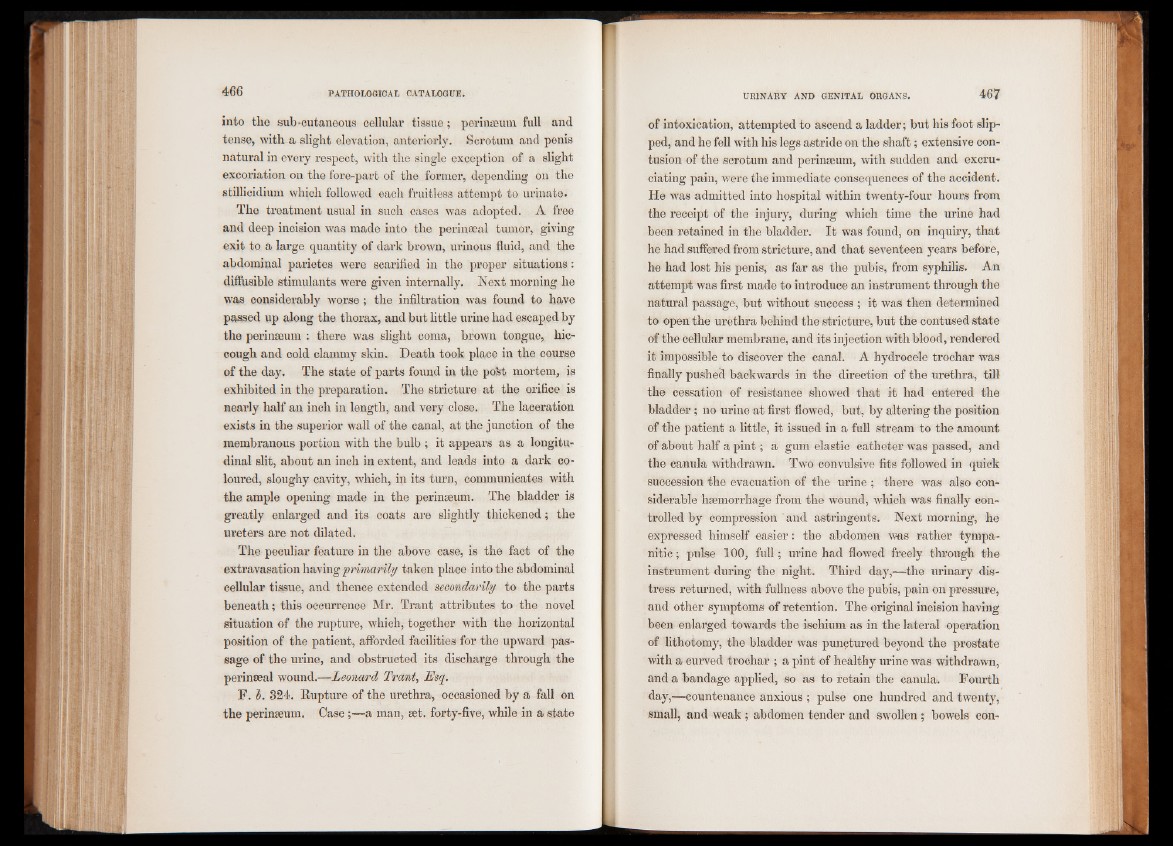
into the sub-cutaneous cellular tissue; perinseum full and
tense, with a slight elevation, anteriorly. Scrotum and penis
natural in every respect, with the single exception of a slight
excoriation on the fore-part of the former, depending on the
stillicidium which followed each fruitless attempt to urinate.
The treatment usual in such cases was adopted. A free
and deep incision was made into the perinseal tumor, giving
exit to a large quantity of dark brown, urinous fluid, and the
abdominal parietes were scarified in the proper situations:
difiusible stimulants were given internally. Next morning he
was considerably worse; the infiltration was found to have
passed up along the thorax, and but little urine had escaped by
the perinseum : there was slight coma, brown tongue, hiccough
and cold clammy skin. Death took place in the course
of the day. The state of parts found in the post mortem, is
exhibited in the preparation. The stricture at the orifice is
nearly half an inch in length, and very close. The laceration
exists in the superior wall of the canal, at the junction of the
membranous portion with the bulb ; it appears as a longitudinal
slit, about an inch in extent, and leads into a dark coloured,
sloughy cavity, which, in its turn, communicates with
the ample opening made in the perinseum. The bladder is
greatly enlarged and its coats are slightly thickened; the
ureters are not dilated.
The peculiar feature in the above case, is the fact of the
extravasation having primarily taken place into the abdominal
cellular tissue, and thence extended secondarily to the parts
beneath; this occurrence Mr. Trant attributes to the novel
situation of the rupture, which, together with the horizontal
position of the patient, afforded facilities for the upward passage
of the urine, and obstructed its discharge through the
perinseal wound.—Leonard Trant, Esq.
F. b. 324. Rupture of the urethra, occasioned by a fall on
the perineum. Case;—a man, set. forty-five, while in a state
of intoxication, attempted to ascend a ladder; but his foot slipped,
and he fell with his legs astride on the shaft; extensive contusion
of the scrotum and perinseum, with sudden and excruciating
pain, were the immediate consequences of the accident.
He was admitted into hospital within twenty-four hours from
the receipt of the injury, during which time the urine had
been retained in the bladder. It was found, on inquiry, that
he had suffered from stricture, and that seventeen years before,
he had lost his penis, as far as the pubis, from syphilis. An
attempt was first made to introduce an instrument through the
natural passage, but without success ; it was then determined
to open the urethra behind the stricture, but the contused state
of the cellular membrane, and its injection with blood, rendered
it impossible to discover the canal. A hydrocele trochar was
finally pushed backwards in the direction of the urethra, till
the cessation of resistance showed that it had entered the
bladder; no urine at first flowed, but, by altering the position
of the patient a little, it issued in a full stream to the amount
of about half a pint; a gum elastic catheter was passed, and
the canula withdrawn. Two convulsive fits followed in quick
succession the evacuation of the urine ; there was also considerable
hsemorrhage from the wound, which was finally controlled
by compression and astringents. Next morning, he
expressed himself easier: the abdomen was rather tympanitic
; pulse 100, full; urine had flowed freely through the
instrument during the night. Third day,—the urinary distress
returned, with fullness above the pubis, pain on pressure,
and other symptoms of retention. The original incision having
been enlarged towards the ischium as in the lateral operation
of lithotomy, the bladder was punctured beyond the prostate
with a curved trochar ; a pint of healthy urine was withdrawn,
and a bandage applied, so as to retain the canula. Fourth
day,—countenance anxious ; pulse one hundred and twenty,
small, and weak; abdomen tender and swollen; bowels con